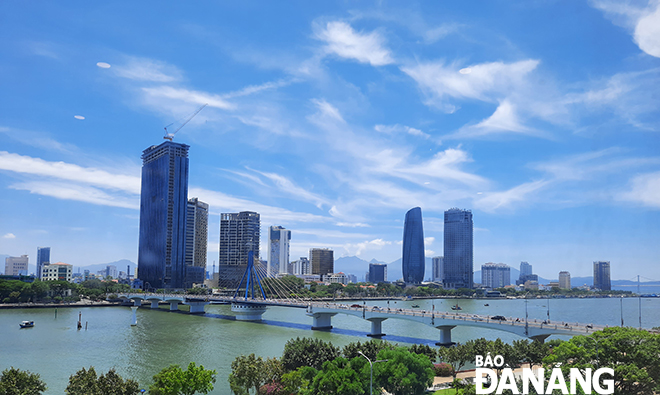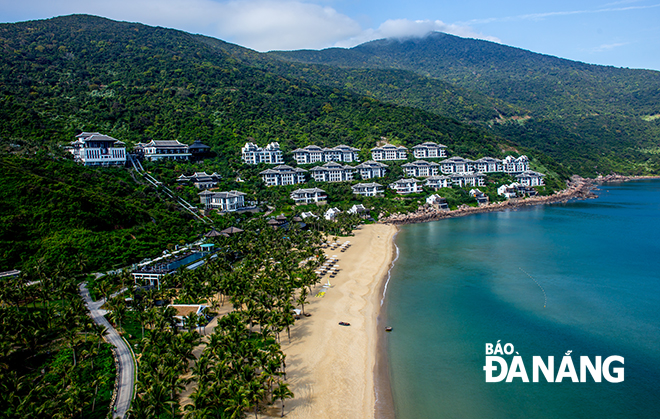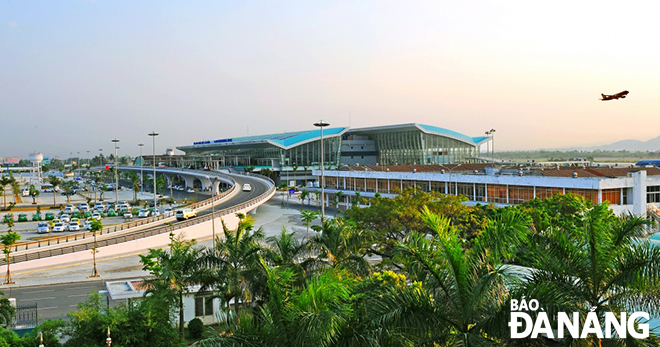National government approves adjustments to Da Nang's master plan by 2030, vision to 2045
Authorised by Vietnamese Prime Minister (PM) Nguyen Xuan Phuc, Deputy Prime Minister Trinh Dinh Dung on Monday signed a decision giving the green light to implement the adjustments to the master plan for Da Nang’s major developments by 2030, with a vision to 2045.
 |
| Viet Nam's national government has approved adjustments to Da Nang's master plan by 2030, vision to 2045 |
The PM demanded that Da Nang government organise the public announcement of the Vietnamese government-approved master plan, review and formulate urban development programmes, subdivision, urban, rural and technical infrastructure planning. Da Nang government must also develop and issue the architectural management regulations serving as the basis for the management of construction activities, and build mechanisms and policies related to finance and land resources for the implementation of priority investment projects.
Another instruction point is that Da Nang must carry out the main framework infrastructure system of its airport, the soon-to-be-developed Lien Chieu deep-sea mega-port and other essential construction works. In particular, the PM asked the ministries of Planning and Investment, and Finance to continue considering capital allocation for the development of the Lien Chieu port.
This adjusted master plan has a planning scope covering Da Nang’s entire administrative boundary of Da Nang with a total area of about 129,046 ha. Under the adjustments to the master plan, Da Nang aims to turn itself into one of the major socio-economic hubs of Viet Nam, and Southeast Asia as a whole, a hub for entrepreneurship, innovation, tourism, commerce, finance, logistics, hi-tech industries, IT, support industries, a centre for high-quality culture, education, healthcare, science and technology development in Viet Nam, a destination for regional and international events, a seaport city.
At the same time, Da Nang targets to become an international marine city, serving as ‘a nucleus’ of the urban chain and the growth pole of a key economic zone in Central Viet Nam and Central Highlands, in tandem with taking its statures as an ecological, modern, smart and livable city and helping firmly ensure national defence - security and the country’s sovereignty over its sea and islands.
 |
| Da Nang tourism cluster will focus on embellishing the east coast and the edge of the Da Nang Bay, and developing cultural heritages, waterway tourism services, and ecotourism in the western and northern mountainous areas and on the Son Tra peninsula in a bid to fully tap their natural landscape and biodiversity potential. |
It is forecasted that, by 2030, Da Nang’ population will have reached about 1.79 million, whilst the city’s total urban construction area is likely to have hit about 31,836 ha, accounting for more than 32% of the city’s total mainland area.
Under the adjusted master plan, Da Nang landscape structure will comprise three typical urban areas, namely waterfront area, green core zone and hillside, plus an ecological region.
There are two so-called ‘economic belts’, namely the northern part boasting high-tech industry and seaport- logistics, and the southern part showing off innovations and high-tech agriculture
Also noticeably, Da Nang will adjust the single-center urban structure (Thanh Khe and Hai Chau districts) into multi-polar development areas.
In addition, there will be 4 priority job creation clusters, namely the high-tech industrial cluster featuring the Hi-tech and IT parks, the seaport and logistics cluster associated with the soon-to-be-developed Lien Chieu mega-port urban area, the hi-tech agricultural cluster in the southwest hillside area adjacent to Dong Nghe Lake, and the innovation cluster associated with the Da Nang University urban area, a innovation centre and a software park in the southern part of the city.
Da Nang tourism cluster will focus on embellishing the east coast and the edge of the Da Nang Bay, and developing cultural heritages, waterway tourism services, and ecotourism in the western and northern mountainous areas and on the Son Tra peninsula in a bid to fully tap their natural landscape and biodiversity potential.
The master plan also identifies key future projects such as a complex of financial, commercial, service and entertainment centres, a cultural and entertainment park southeast of the city’s 2 September Peace Monument, the VinaCapital Da Nang golf course, the complex of facilities in service of the Da Nang International Fireworks Festival, a theme park to the south of the Son Tra Peninsula, the Ba Na - Suoi Mo eco-tourism complex, the Ba Na Hills tourist area, the Lang Van integrated resort tourist area, and the InterContinental Danang Sun Peninsula Resort.
 |
| The Da Nang International Airport eyes to reach its annual capacity of 30 million passengers by 2030. |
The green light has been given to securing the Da Nang International Airport’s annual capacity of handling 30 million passengers by 2030, and building the Lien Chieu port with an annual capacity of 50 million tonnes and a total area of about 450 hectares (including the water surface).
The city will focus on high-tech development with a total area of about 1,710 ha of land, and attach importance to developing logistics centres and warehouses covering a combined total area of about 229 ha. Specially, there will be the planned logistics centres for Lien Chieu, new Kim Lien Railway Station, the Da Nang High-Tech Park, Hoa Nhon IP, Tien Sa Port and the aviation industry.
Each urban area will comprise of a maximum of 10 residential areas covering a total area of 500 to 1,500 ha and accommodating a combined total of about 50,000 to 250,000 people.
A comprehensive system of such service facilities as commercial centres, kindergartens, primary and secondary schools, medical clinics, religious establishments public greenery and parking lots must be created in the aforementioned urban areas.
Likewise, trade centres, supermarkets, specialised shopping streets, convenience stores, central business districts (CBDs) and duty-free shops citywide associated with the development of Vo Nguyen Giap - Truong Sa tourist street.
It is known that Da Nang government has been working with Singaporean-based firms Sakae Corporate Advisory and Surbana Jurong to make adjustments to the strategic master plan for the city's major developments.
By TRIEU TUNG-Translated by A.T